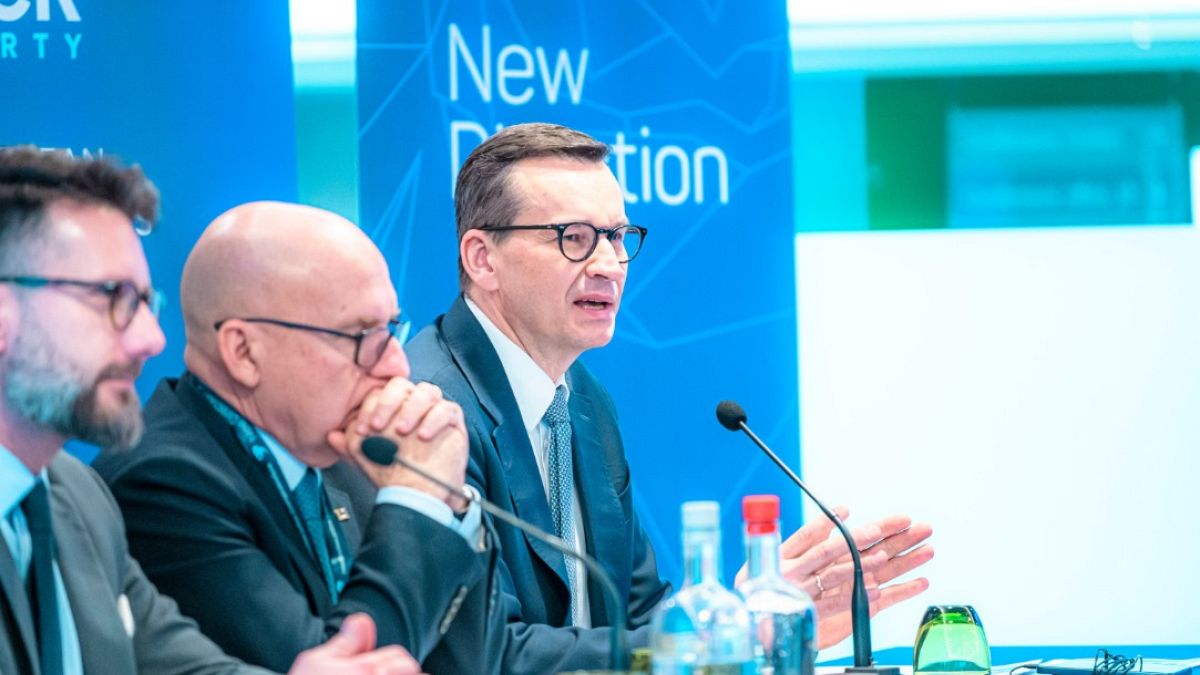‘If there is an option to build a coalition with EPP and with the Patriots of Europe we can do so,’ former Polish Prime Minister told journalists.
Former Polish Prime Minister Mateusz Morawiecki was elected as President of the European Conservatives and Reformists (ECR) Party on Tuesday in Brussels, replacing Italian Prime Minister Giorgia Meloni. ECR, includes right-wing Brothers of Italy, Polish Law and Justice, and Romanian AUR among its 12 European member parties, and the US Republican Party and Israel’s Likud among its seven “global partners”.
The party congress also elected the Italian Carlo Fidanza (Brothers of Italy), France’s Marion Maréchal (Identité Libertés), and the Romanian George Simion (AUR) as vice presidents.
During a subsequent press conference, newly elected President Morawiecki staked a more prominent role for ECR in European politics, claiming the party would play a “key actor” role in transatlantic relationships owing to its ties with the US Republican Party.
The former Polish Prime Minister also recited familiar ECR manifesto pledges: the need to cut red tape to boost economic development in Europe, a tough position on irregular migration, and opposition to a common EU foreign policy that overrides the right of veto for member states.
He envisaged tighter cooperation with the European People’s Party, despite this being home to Donald Tusk’s Civic Platform, the rival domestic party of Morawiecki’s Law and Justice.
“We might disagree with EPP on many issues, but if there is an option to find a way to build a coalition with EPP and with the Patriots of Europe on some important things for us, we can do so,” Morawiecki said, defining his party as “very pragmatic”.
ECR could be the centre of a new coalition, he said, composed of the EPP (on its left) and Patriots for Europe (on its right). “We can cooperate with them for the good of Europe and for the good of the Member States of Europe.”
This coalition has already manifested in some votes in the European Parliament and has been labelled the “Venezuela majority”, after right-wing MEPs united to recognize Edmundo González as Venezuelan president in a symbolic, non-binding resolution adopted by the European Parliament in October.
Meanwhile, other political forces remain committed to excluding the ECR from power. Renew Europe group’s leader Valérie Hayer ruled out any cooperation with ECR as a whole in the European Parliament, even if she does not put all the conservative parties on the same footing.
“No collaboration at all with the far right,” she said on Tuesday during a press briefing in Brussels, pledging that the liberal group is ready to vote down proposals – even if it agrees on substance – if they are put forward by EPP and ECR together.
With 80 members of the European Parliament, coming from 19 EU Member States, ECR is the fourth-largest group in the Parliament. Its MEPs were split over a vote to approve the new European Commission last year, with 39 lawmakers against, 33 in favour, and four abstentions.
Conservative parties who supported the Commission claim they want to reverse the Green Deal’s policies and take a more aggressive approach to curb irregular migration.

